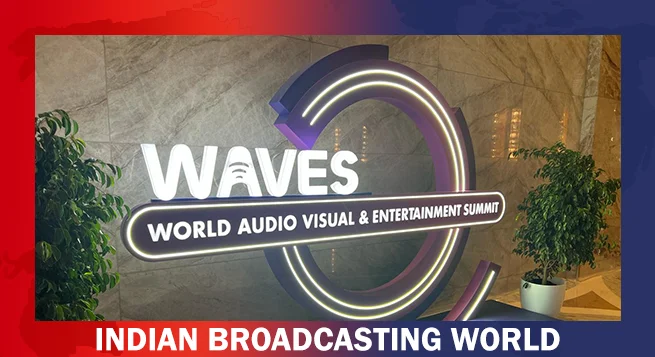The US India Strategic Partnership Forum (USISPF) has suggested to the Indian government, via a TRAI submission, not to impose public service mandates on private sector TV services through a National Broadcast Policy (NBP) and maintain a distinction between various types of services available in the market.
“Given (public broadcaster) Prasar Bharati’s entrenched position, there is no requirement to impose overlapping mandates on the private sector,” USISPF has said in its submission to broadcast rergulator’s ‘Pre-Consultation Paper on Inputs for Formulation of National Broadcasting Policy’.
The business lobbying body pointed out that “blurring the distinct role of public and private broadcasters will stymie the growth” of the private sector and limit the latter’s ability to cater to the creative needs of the broadcasting industry as well as viewers.
Given India’s size and diversity, the growth and development of the public broadcaster has played a crucial role in disseminating news and information across the nation. Prasar Bharati (Doordashan and All India Radio) has a long-standing presence in India and operates to serve the objective of public duty, it said.
Amongst the other suggestions the USISPF has made include the following:
Principles Based Policy: The National Broadcasting Policy should set out overarching principles that provide a roadmap for regulators as they develop rules and regulations for this sector.
Given that the broadcasting sector includes diverse stakeholders operating in a rapidly changing technological environment, prescriptive measures will prevent the policy from being future-proofed and current with evolving technology, business models and viewer consumption trends.
Maintain Distinction Between Different Services: While the background sets out that the “broadcasting sector consists of television and radio services”, the suggested framework includes digital media (both intermediaries and publishers of online curated content) and print media as “broadcasting services”.
“We recommend that the policy acknowledges the differences in these distinct sectors. There are technical distinctions between telecom, broadcasting, and digital services (including the infrastructure and mode of transmission), which justify separate treatment,” USISPF stressed.
It backed its assertions by highlighting that the Telecom Disputes and Settlement Appellate Tribunal (TDSAT) has held that an OTT service is not a TV channel based on several distinctions between the two, and the separate laws that govern the services.
Moreover, the Ministry of Electronics and Information Technology (MeitY) has administrative jurisdiction over both intermediaries and Online Curated Content Providers (OCCPs), and regulates them under the Information Technology Act, 2000 and the Information Technology (Intermediary Guidelines and Digital Media Ethics Code) Rules, 2021. The Indian Telegraph Act, 1885 and corresponding rules empower the Department of Telecommunications to oversee the regulation of the telecom sector.
Upcoming laws such as the Indian Telecommunication Act, Digital India Act and Broadcasting Services Act are also likely to further draw out these distinctions. Accordingly, the National Broadcasting Policy should acknowledge these distinctions as well.
Mission: The National Broadcasting Policy should focus on:
- Developing a vibrant and resilient broadcasting sector by enabling an ecosystem for high-quality content creation in a variety of languages and formats, and ensuring dissemination of reliable news and information.
- Positioning India as a global hub for content production (including local content) and exporting Indian content to the world.
- Creating a roadmap to recognise, protect and uphold intellectual rights protections.
- Developing technical capabilities in emerging technology such as animation and visual effects to meet global requirements for skilled labour.
- Creating a globally competitive and growth-oriented broadcasting sector with enhanced ease of doing business, state-of-the-art infrastructure, seamless market entry, world-class distribution technology, enhanced content security with strong intellectual property protections and anti-piracy frameworks.
Objective: An enabling policy framework for the broadcasting sector can double the broadcasting sector’s contribution to the Indian economy by 2047 in terms of revenue (as a share of GDP), employment, and export value as a share of total exports.
The key objectives should include:
- Measuring the broadcasting sector’s contribution to the Indian economy and setting targets for the sector.
- Easing the business environment by focusing on light-touch regulation.
- Building sector-specific institutional capacity to address existing and emerging concerns.
- Increasing the size and scope of the broadcasting value chain via investment promotion.
- Fostering the growth of state-of-the-art broadcasting infrastructure across all relevant supply chains
- Transforming India into a global content hub.
- Promoting greater transparency in TV and radio broadcasting by encouraging robust audience measurement.
- Strengthening grievance redressal & consumer feedback processes for quality of service.
- Reinvigorating public interest programming hosted by the public broadcasters.
- Skilling and capacity building in keeping with market forces and new- age technology.
- Formulating a Disaster Recovery Mechanism for both air-assets (such as satellites and transponders) and ground-assets (including teleport) as the sector is involved in round the clock content dissemination involving multiple service providers, including content producers, satellite operators and earth stations.
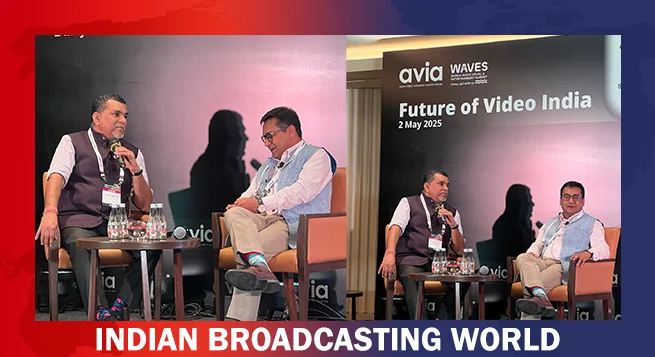 Pay TV leaders chart course for India’s linear TV in digital age
Pay TV leaders chart course for India’s linear TV in digital age 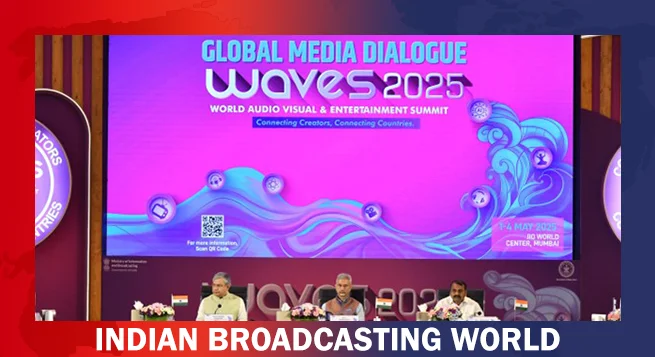 WAVES 2025: Media dialogue backs creativity, heritage & ethics in AI Era
WAVES 2025: Media dialogue backs creativity, heritage & ethics in AI Era 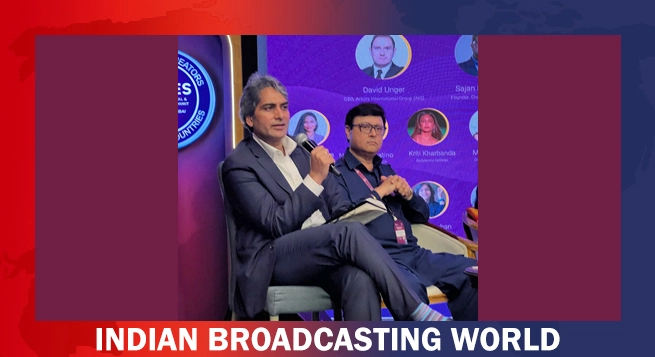 Sudhir Chaudhary announces new show for DD News, says “Good content still has a place” at WAVES 2025
Sudhir Chaudhary announces new show for DD News, says “Good content still has a place” at WAVES 2025 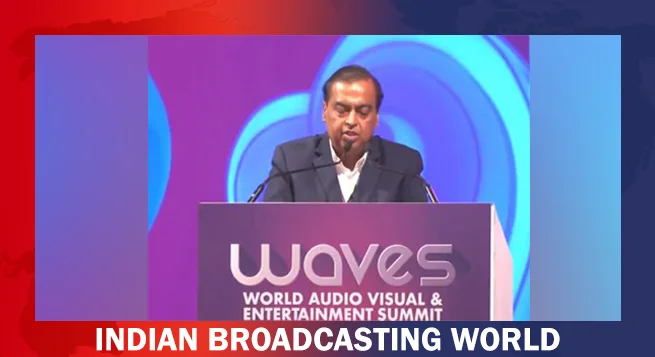 India can lead global entertainment revolution: Mukesh Ambani
India can lead global entertainment revolution: Mukesh Ambani 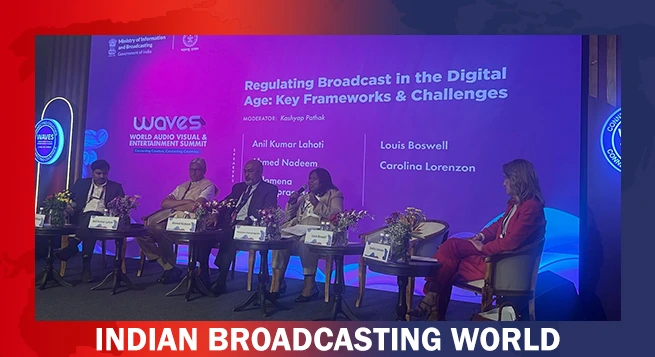 TRAI chief not in favour of separate rules for OTT, legacy b’casters
TRAI chief not in favour of separate rules for OTT, legacy b’casters 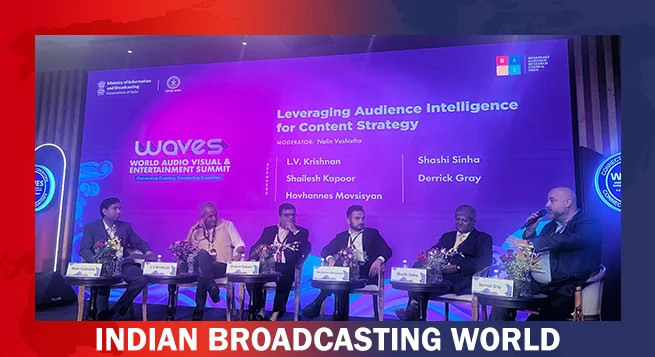 Stakeholder alignment media’s big media challenge: BARC Chairman
Stakeholder alignment media’s big media challenge: BARC Chairman 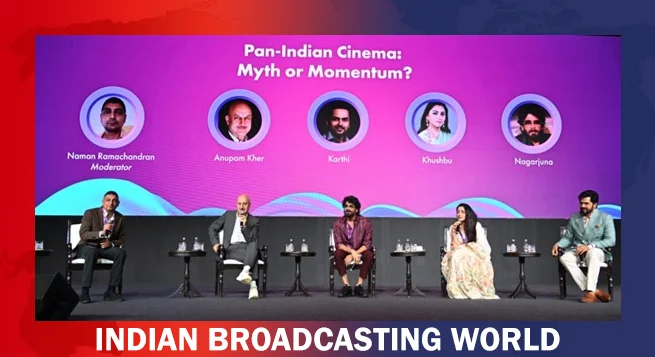 Language no bar; stars say Indian cinema is united by emotion, culture
Language no bar; stars say Indian cinema is united by emotion, culture 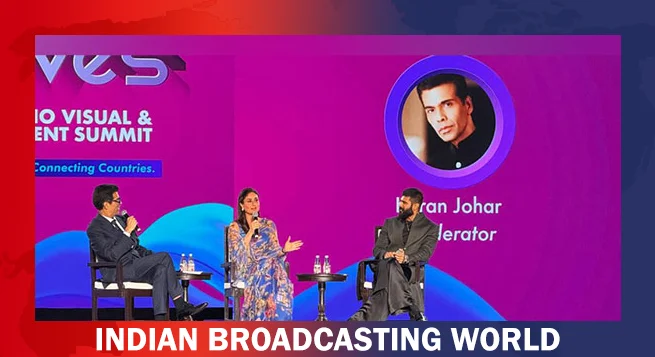 Spielberg recognised me from ‘3 Idiots’, says Kareena at WAVES 2025
Spielberg recognised me from ‘3 Idiots’, says Kareena at WAVES 2025 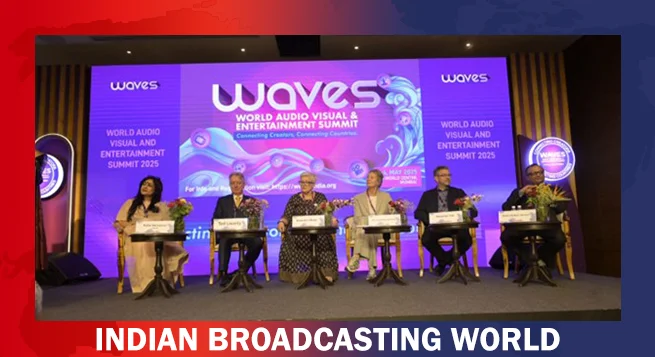 Digital Radio is the future, but analog must co-exist says at WAVES 2025
Digital Radio is the future, but analog must co-exist says at WAVES 2025 



